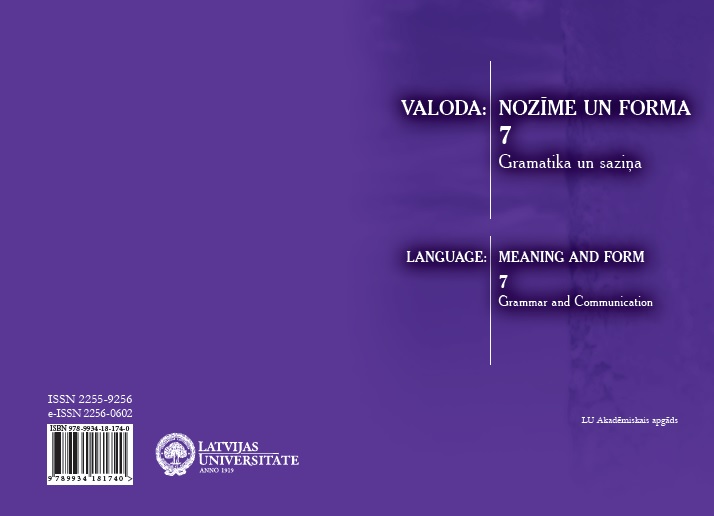On some empty categories in Icelandic and Latvian (PRO and pro)
On some empty categories in Icelandic and Latvian (PRO and pro)
Author(s): Dens DimiņšSubject(s): Language and Literature Studies, Theoretical Linguistics, Applied Linguistics, Comparative Linguistics, Baltic Languages
Published by: Latvijas Universitātes Akadēmiskais apgāds
Keywords: PRO; pro; null forms; empty categories; Icelandic; Latvian; generative grammar; deep structure; surface structure;
Summary/Abstract: Empty categories are abstract elements in the deep sentence structure. This paper deals with the pronominal null subjects – big PRO and small pro. The article provides definitions and refers to further theoretical discussion of these empty categories from a generative perspective. Null subjects are relevant to the principle of the economy of language resources, Universal Grammar and are certainly present in all languages. Two Indo–European languages are selected for comparison, one Germanic (Icelandic) and the other Baltic (Latvian). There are similar patterns in PRO and small pro constructions in Icelandic and Latvian which suggests some surface-level structural similarity between the two languages. However, despite the overlaps there are also significant differences, especially with regard to case government with infinitivals, the use of the dummy subject and the explicit (overt) pronoun use in the imperative. The main part of this paper discusses the types and the classification of the constructions featuring big PRO and small pro in both languages. Among the infinitive constructions with PRO are (1) the referential or controlled, (2) uncontrolled or arbitrary and (3) expletive construction. There are eight little pro constructions with the verb in finite form: (1) the impersonal construction, (2) the impersonal-passive construction, (3) the extraposition construction, (4) the imperative/optative, (5) the elliptical construction, (6) elliptical answers/remarks, (7) stage directions and (8) exclamations. Further, there are three less marginal constructions, namely, (1) the impersonal present participle construction, (2) the impersonal modal construction and (3) the ergative construction.
Journal: Valoda: nozīme un forma
- Issue Year: 2016
- Issue No: 7
- Page Range: 14-30
- Page Count: 17
- Language: English

